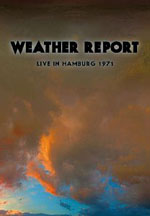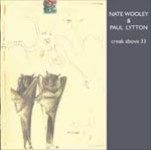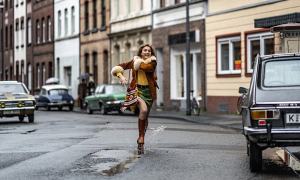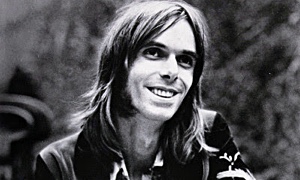Home » Jazz Articles » Film Review » Weather Report: Live in Germany 1971
Weather Report: Live in Germany 1971
 Weather Report
Weather Report Live in Germany 1971
MVD/Gonzo Distribution
2010
While technology has made audio and video recording a much easier thing in the 21st century, there's still the problem of where to broadcast it. Sure, there's the internet, and YouTube, for example, has become a treasure trove of archival live footage from bands that might otherwise have been forgotten. But it's chaos, with no real order or theme to the footage—just an overwhelming amount that, for the interested fan, can sometimes take hours to weed through to get to the real gold. Yet while European television and radio continues, to this day, to trump North America in its attention to live programming beyond reality shows and American Idol and its spin-offs, the 1960s and 1970s represented a tie when organized live radio and television was at its peak. As more and more archival footage is uncovered, it's also clear that what was available commercially—even from popular groups with major label deals—was only part of the story.
Take Weather Report, the fusion super group begun by a couple of Miles Davis alumni. Keyboardist Joe Zawinul may not have been an official or touring member of the late trumpeter's bands at the dawn of the 1970s, but his contribution to seminal Davis releases cannot be understated; it was the ex-Cannonball Adderley pianist who, after all, contributed the title track to one of Davis' most important albums ever, In a Silent Way (Columbia, 1969). Saxophonist Wayne Shorter, on the other hand, teamed up with Davis in 1963, and was part of the trumpeter's second (and, perhaps, greatest) longstanding quintet, alongside keyboardist Herbie Hancock, bassist Ron Carter and drummer Tony Williams. Together, along with young upstart Czech bassist Miroslav Vitous, Zawinul and Shorter formed Weather Report in 1971. It was a group which may have emerged from under the shadow of Davis' In a Silent Way-era innovations, but which ultimately garnered more consistent critical acclaim during its time and, at times, far greater commercial success, especially when it moved towards more accessible music, with Vitous ultimately replaced by one of the most important electric bassists of the 20th century, Jaco Pastorius.

From left: Alphonse Mouzon, Dom Um Romao, Joe Zawinul Wayne Shorter, Miroslav Vitous
When Weather Report released its eponymous Columbia debut in 1971, it was a far freer beast than the more commercially successful one that would release albums like Heavy Weather (Columbia, 1977) and hit songs like Zawinul's "Birdland" a half decade later. Weather Report (Columbia, 1971) may have been a more abstract and, at times, ethereal listen, but what the recently unearthed television performance of Live in Germany 1971 proves is that Zawinul, Shorter and Vitous—accompanied in a transitional line-up by soon-to-depart drummer Alphonse Mouzon and new recruit, percussionist Dom Um Romao—were a lot more concerned with pulse than their studio album let on. It would be two more albums, in fact, before Weather Report announced its more groove-laden intentions with Sweetnighter (Columbia, 1973), but this DVD demonstrates that the group was, at least some of the time, already knee-deep in the funk...far more, in fact, than was let on by the originally Japan-only Live In Tokyo (Sony Japan, 1972), from which edited versions of longer medleys were culled for the second side of the group's worldwide sophomore release, I Sing the Body Electric (Columbia, 1972)—let on.
There's plenty of freedom to be found on this wonderfully spartan performance, where Romao's assorted percussion—ranging from tambourines and triangles to berimbau and a pair of wooden shoes that he brings together with reckless abandon at the start of the 48-minute set—is laid out on a plain wooden table that looks as though it was grabbed from Radio Bremen's lunch room. Playing more than half of the material from its debut album, the group heads into ethereal, almost pastoral (were it not for a certain foreboding undercurrent) territory, especially early in the set on a version of "Orange Lady" so radically altered as to be nearly unrecognizable; this, after an equally transformed version of the more assertive "Umbrellas." Vitous was always somewhat generic on electric bass (one reason why, ultimately, he had to go), but his acoustic bass work—especially when playing with a bow—was another matter altogether. To this day, few bassists possess Vitous' instantly recognizable tone and lithe dexterity—characteristics that the bassist has continued to demonstrate as recently as Molde Jazz 2010, in performance with guitarist Terje Rypdal and drummer Gerald Cleaver. Combined with Romao's delicate hand bells and bird whistles, Zawinul's chiming Fender Rhodes and Shorter's soaring soprano, it's Weather Report at its most transcendent.

From left: Alphonse Mouzon, Dom Um Romao, Joe Zawinul
Elsewhere, in the 10-minute ending medley that includes one of Zawinul's most enduring classics, "Dr Honoris Causa," Mouzon brings out the funk in ways that his successor, Eric Gravatt, simply never could (or, at least, did)—explaining, perhaps, why Live in Tokyo is a more turbulent affair overall, that now appears to be a wonderful but still evolutionarily curious mid-point between this incarnation of Weather Report and the one that would record Sweetnighter a couple years later. The Weather Report heard and seen on this DVD pushes draws a far straighter line to Zawinul's days with Adderley than ever before—Mouzon even singing briefly, with bluesy conviction—but the keyboardist's "everybody solos and nobody solos" aesthetic remains firmly in place, as well as the unfettered adventurous spirit that, by the time of Tale Spinnin' (Columbia, 1975), would largely become a thing of the past.
With unadorned visuals and a clean and crisp stereo mix, Live in Germany 1971 isn't just important as the only commercially available video documentation of a super group in its infancy; it matters because it alters previous perceptions about where the group was at this particular point in time. At a time when the word "fusion" was neither dirty, nor loaded down with the baggage which would soon hobble at least some of its creative potential, Weather Report was combining improvisational freedom, European classicism and electrified energy with a predilection for rock and funk-infected groove in a way that brings a whole lot more sense to what, at the time, seemed more like paradigm shift than logical evolution with Sweetnighter. As seminal as I Sing the Body Electric remains (especially Zawinul's stunning opener, "Unknown Soldier"), with the unearthed evidence of Live in Germany 1971 it seems likely—or, at the very least, possible—that the album deflected from the core premises that drove the group from inception; essentials that are now in full view on this short, but extremely sweet, archival find.
Tracks: Umbrellas; Orange Lady; Waterfall; Seventh Arrow; TH; Morning Lake; Improvised Medley, Including Dr Honoris Causa.
Personnel: Joe Zawinul: keyboards; Wayne Shorter: tenor and soprano saxophones; MIroslav Vitous: electric and acoustic bass; Alphonse Mouzon: drums, vocal; Dom Um Romao: percussion.
Photo Credits
Photos captured from Weather Report: Live in Germany 1971, courtesy of MVD/Gonzo Distribution.
Tags
Weather Report
DVD/Film Reviews
John Kelman
United States
Miles Davis
Joe Zawinul
Cannonball Adderley
Wayne Shorter
Herbie Hancock
Ron Carter
Tony Williams
Miroslav Vitous
Jaco Pastorius
Alphonse Mouzon
Dom Um Romao
Terje Rypdal
Gerald Cleaver
About Weather Report
Instrument: Band / ensemble / orchestra
PREVIOUS / NEXT
Support All About Jazz
 All About Jazz has been a pillar of jazz since 1995, championing it as an art form and, more importantly, supporting the musicians who make it. Our enduring commitment has made "AAJ" one of the most culturally important websites of its kind, read by hundreds of thousands of fans, musicians and industry figures every month.
All About Jazz has been a pillar of jazz since 1995, championing it as an art form and, more importantly, supporting the musicians who make it. Our enduring commitment has made "AAJ" one of the most culturally important websites of its kind, read by hundreds of thousands of fans, musicians and industry figures every month.

























